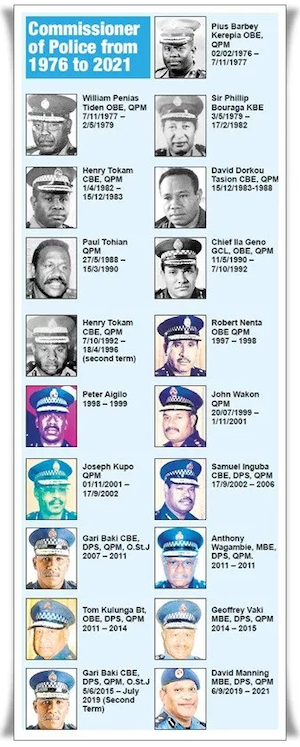COMMENT: By Bryan Kramer, PNG’s Minister of Police who has defended Commissioner Manning’s appointment today in The National
My last article, announcing that I intend to make a submission to the National Executive Council (NEC) to amend the Public Service regulation to no longer require the Commissioner of Police to hold a tertiary degree, prompted a number of readers to suggest this would be an act nepotism, corruption and self-interest.
While I found these claims rather amusing, they are also disturbing as it shows some people are either genuinely ignorant of the issues, or just plain stupid.
What is the regulation that stipulates a person must obtain a tertiary degree to qualify for the appointment of Departmental Head (Secretary of Department)?
In 2003, the NEC approved a regulation called the Public Service (Management) Minimum Person Specification and Competence & Regulations for Selection and Appointment of Departmental Heads and Provincial Administrators.
This regulation provided that any person applying for a position of Departmental Head or Provincial Administrator must meet a number of minimum requirements to be considered for the appointment. These requirements number more than 18 and include everything from minimim tertiary education, over age of 35, management experience and skills to health and fitness.
So there is no confusion, this regulation was proposed by the Department of Personnel Management as the agency responsible for Public Service through the Minister of Public Service for NEC’s approval.
While Acts of Parliament (laws) are subject to approval by Parliament, regulations are approved by NEC.
Regulations like bylaws
Regulations are like bylaws to an Act of Parliament and are intended to provide more detailed processes and procedures when implementing provisions or sections of an Act (law).
When NEC introduced the regulation specifying the minimum requirements for persons to be appointed to be Departmental Head and Provincial Administrators, did it intend the regulation to apply to the Commissioner of Police?

Short answer, in my respectful view, is No.
My evidence to support this view is that NEC appoints the Commissioner of Police and, if it intended the Commissioner of Police to be subject to the regulation, then it would have applied it to every Commissioner of Police appointed since 2003.
The same can be said about the Department of Personnel Management which proposed the regulation in the first place and would have otherwise applied it in the shortlisting of candidates for the position.
Since the introduction of the regulation, how many Commissioners of Police have had a tertiary qualification?
Short answer is none.

Six post-regulation appointments
Since the introduction of the regulation by NEC there have been six appointments to Commissioner of Police. Not one has possessed a tertiary degree.
In fact, since 1945 more than 23 people have served as Commissioner of Police and only one of them possessed a tertiary education – Peter Aigolo, 1997-1999.
It is the role of Members of Parliament to pass legislation, NEC to pass regulation and the court to interpret and uphold law consistent with its intended meaning, purpose and Constitutional law.
The Supreme Court has held in numerous of its judgements over the years that, when interpreting laws passed by Parliament, it is important to understand and consider the intent of the legislature when they introduced the law.
In this case, the question is did the NEC intend the regulation to be applied to the appointment of Commissioner of Police?
Based on the above evidence, my respectful view is No.
I don’t believe this evidence or argument was raised before the National Court to assist the Court in arriving at its decision. Perhaps it was the case of those drafting the regulation failing to make it clear.
The decision of the National Court is not final, as the Commissioner of Police may exercise his right to appeal the decision to the Supreme Court for a three-man bench to review the decision.
NEC may also exercise its Constitutional powers to correct any confusion in the application of the regulation to make it consistent with its intended purpose.
The decision to introduce regulation, rescind, amend or correct it, including in the appointment of the Commissioner of Police, lies with NEC.
Republished from Police Minister Bryan Kramer’s personal blog. The original headline on this article was: “Where did minimum requirements for Chief of Police come from?” Asia Pacific Report often republishes Minister Kramer’s articles.
Article by AsiaPacificReport.nz








